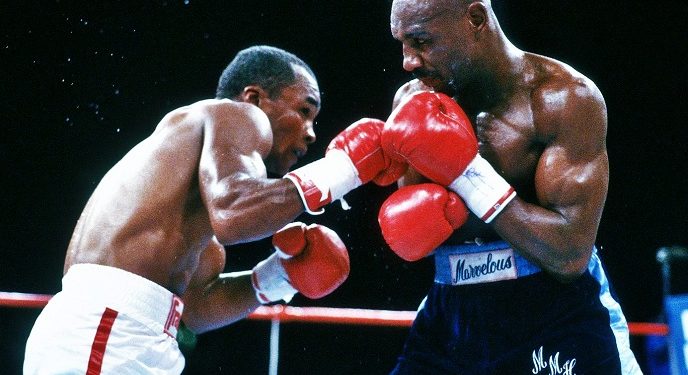On an unforgettable night in April 1985, Marvelous Marvin Hagler reached the pinnacle of professional boxing after years of perseverance. Twelve years of grit and determination finally paid off when he faced Thomas Hearns and decisively knocked him out in the third round of what many call one of the most brutal fights ever. For Marvin, who had been the reigning middleweight champion for almost five years and the unofficial king for even longer, that moment was his crowning achievement. With blood streaming down his face, Hagler stood victorious as the referee declared him the winner, sealing his legacy as arguably the best fighter on the planet.
The path to that triumph, however, was anything but smooth. An ominous prediction from the legendary Smokin’ Joe Frazier had haunted Hagler. When they met in Philadelphia in the late ’70s, Frazier warned that it would be a long, tough road for the young pugilist because he was black, a southpaw, and exceptionally good. Those qualities made Hagler a high-risk opponent that many titleholders avoided. Even when he was finally given a shot at the world title in 1979 as a preliminary to Sugar Ray Leonard’s victory over Wilfred Benitez, the decision was heartbreakingly close, declared a draw even though Marvin seemed the clear winner against Vito Antuofermo. And while he did claim the world title from Alan Minter in London the following year, the celebration was cut short by unruly fans who littered the ring with debris.
Despite being shunned from glory that was rightfully his, Hagler continued to push through with passion and talent, dismantling opponents left and right. But it was his conclusive destruction of Thomas Hearns that truly earned him worldwide acclaim, finally bringing him the recognition and opportunities he deserved, making him a fixture on talk shows and the face of lucrative endorsements.
Post-victory, Hagler took a break from boxing, a respite that visibly impacted the sport’s excitement level. With other big draws like Sugar Ray Leonard out of the picture and Mike Tyson yet to make his mark, Hagler was the leading star. Fans eagerly anticipated a sequel to the epic Hagler vs. Hearns showdown, and to set the stage, both fighters appeared on the same Las Vegas card the following year. Hearns left fans awestruck with a first-round knockout, while Hagler, though still victorious, seemed to have lost some of his edge during his arduous eleven-round fight against John Mugabi. His performance offered a compelling narrative for Ray Leonard, who was keenly watching from ringside.
Throughout his career, Hagler was known for his steadfast dedication and unrivaled work ethic. He often referred to his training camps as incarcerations, pushing himself relentlessly fueled by a deep-seated sense of injustice from years of being underrated. But after finally basking in the glory post-Hearns, that fiery drive appeared to have waned, perhaps dulled by newfound fame and fortune.
When Ray Leonard emerged to propose a showdown after the Mugabi bout, initial reactions were skeptical. Most considered Leonard, with his long hiatus and smaller frame, an easy target for the reigning champion. There was speculation that Hagler might choose to face Hearns again first, but instead, he stunned everyone by contemplating stepping away from the sport altogether. He declared he needed time to decide.
Ultimately, somewhat reluctantly, Hagler agreed to the fight with Leonard — a choice more influenced by lucrative incentives and peer pressure than a genuine hunger to compete. The negotiations tilted heavily in Leonard’s favor, with favorable fight conditions like the ring size and glove specifications. When the fight finally came around, Hagler, once a paragon of ferocity, seemed like a shadow of his former self, lacking the vital intensity that had defined his earlier days.
As the bout unfolded, Hagler initially underestimated his opponent, adopting an orthodox stance expecting a more aggressive Leonard. But Leonard skillfully claimed the early rounds with tactical prowess. The match showcased two veterans, but it was Leonard who appeared sharper against a struggling Hagler, who could not muster the vigor that once defined him.
Leonard’s split decision win was a surprise to many, and the offer of a rematch lingered in the air, but Hagler had made up his mind. He stepped away from the ring, opting instead to embrace a new life in Italy, leaving boxing behind. It was a decision filled with wisdom, perhaps taken a bit later than ideal, but symbolized a fitting end to an illustrious career.
Michael Carbert






















